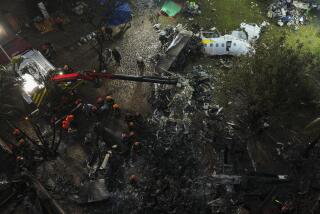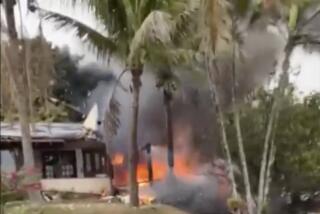Brazilians vent rage at officials
- Share via
SAO PAULO, BRAZIL — For months, Brazilians have been using the phrase “air blackout” to describe the crisis in the country’s aviation system that reached epic proportions this week with the worst crash in the nation’s history.
The use of this phrase is no accident. It evokes Brazil’s energy “blackout” of 2001, when the government imposed emergency restrictions in Sao Paulo, Rio de Janeiro and other large cities in an attempt to curb energy use at a time when long droughts had drained hydroelectric power plant reserves.
As with the energy crisis, the aviation crisis appears to have raised doubts among many Brazilians about their government’s ability to deal rapidly and effectively with an ongoing problem, hold officials accountable for their decisions and punish those responsible for failure.
While much of this week’s indignation has been directed at the government of President Luiz Inacio Lula da Silva, some say the problem goes beyond his administration and reflects more fundamental flaws in Brazilian society.
Lula and other top officials this week have avoided making public pronouncements about the crash at Sao Paulo’s central city Congonhas airport that killed at least 190 people. However, they have been advancing theories that it might have been caused by mechanical failures with the plane rather than more systemic failures, and some here perceive what they say as an age-old tendency by Brazil’s ruling classes to shirk blame.
“The Brazilian state does not acknowledge to any extent the notion of accountability,” said Roberto Romano, a professor at the Institute of Philosophy and Human Science at the State University of Campinas in Sao Paulo state. “This happens again and again, and it has been worsened by two dictatorships of absolute power.”
But in the crash’s acrid aftermath, Brazilians this week have been witnessing an unusual spectacle. Ordinary citizens have voiced anger and frustration in a very public way that recalls how Americans reacted to the Bush administration’s response to Hurricane Katrina. Several exchanges between the media and government aviation officials have been sharp, even antagonistic. Many commentators have been unsparing in their criticism.
“Brazil has been going through an authority blackout,” political commentator Lucia Hippolito said on a national radio talk show, referring to Lula and Defense Minister Waldir Pires. She and other pundits have been especially critical of Lula for failing to make a major public statement about the crash. In a nationally televised address Friday night, Lula announced that the number of flights at Congonhas would be reduced and that a location for a new airport in Sao Paulo would be announced within 90 days.
Opposition politicians, meanwhile, have been calling for the resignation of key officials, notably Pires. As head of the military, which helps run Brazil’s aviation systems, Pires was at pains this week to argue that he bears no blame for Tuesday’s crash.
Brazil’s aviation infrastructure has been plagued with chronic delays and cancellations, disgruntled air traffic controllers and a series of accidents and close calls -- including the collision in September of a private jet and a Brazilian Boeing 737 over the Amazon jungle, in which 154 people died.
“Please read the law,” a visibly exasperated Pires said to reporters at a Friday afternoon news conference. “I’m not responsible for air traffic management.”
The belief of some Brazilians that their government is more concerned with polishing its image than solving the aviation chaos was underscored by an incident Thursday in which Lula’s advisor and minister without portfolio Marco Aurelio Garcia was shown on national television seemingly making an obscene, triumphant gesture in reaction to news that a flawed brake system may have contributed to the crash. Garcia has since apologized for the gesture, which the opposition Brazilian Social Democracy Party labeled “an offense to the Brazilian people.”
Robert Ditchey, a Los Angeles aviation consultant and former airline executive, said the way Brazilian officials handled the September crash was “inept.” Despite apparent evidence that Brazil’s air traffic control system had been at least partially responsible for miscommunication between the two planes, charges recently were filed against the two U.S. pilots of the private jet, which landed safely.
“I was embarrassed for Brazilians in how they handled this,” Ditchey said of last fall’s accident, which until Tuesday had been the country’s deadliest airplane crash. “People in aviation felt this whole thing was an embarrassment and absurd.”
In addition to Brazil’s long dictatorships, Romano said, another reason for the country’s culture of non-accountability has been the South American giant’s highly centralized administrative structure, in which the federal government receives about 70% of all taxes and presidential power has fewer checks and balances than in the U.S. or Western European systems.
What’s more, Brazilian politicians can’t be sued or prosecuted while in office, even when potential criminal offenses are involved. “There is this constant taking the blame off the authorities and laying it on the population,” Romano said.
It remains to be seen whether this week’s extraordinary backlash will alter that equation. But while Brazilians aren’t averse to making their dissatisfactions known, converting those feelings into political change is likely to be a much greater challenge.
“I am 62 years old, I have been involved with politics since the 1960s, and I see no possibility for this anger to be translated into action,” Romano said.
More to Read
Sign up for Essential California
The most important California stories and recommendations in your inbox every morning.
You may occasionally receive promotional content from the Los Angeles Times.










